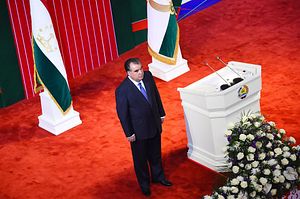Given the advance of illiberal policies from Manila to Moscow over the past few years — to say little of the autocratic entrenchment in Astana, Ashgabat, Tashkent, and Dushanbe — the release of Xavier Marquez’s Non-Democratic Politics could not have come at a better time. Offering an overview of the means and methods of juntas, autocracies, monarchies, and totalitarian regimes, Marquez’s read brings a broad, if academic, introduction to those scratching their heads at just how easily Kazakhstan’s Nursultan Nazarbayev, Turkmenistan’s Gurbanguly Berdymukhamedov, Russia’s Vladimir Putin, and Tajikistan’s Emomali Rahmon have hardened their grip on domestic political control and how leaders like Singapore’s Lee Kuan Yew and Indonesia’s Suharto have provided models current non-democracies hope to follow.
Running through the three “basic kinds of social control” purveyed by these regimes (competitive authoritarian, authoritarian, and totalitarian), Marquez puts together a theoretical tour de force on how non-democracies have molded support among constituents — especially as it pertains to the patronage networks developing even in “the most personalized regimes.” Ranging from the construction of party support — think: post-Soviet one-party states, including Kazakhstan and, by now, Tajikistan — to the drop-off of military coups, Marquez narrates the changing face of non-democratic rule, including those regimes attempting to unwind post-Cold War liberalism.
Understandably, Central Asia largely escapes mention throughout Marquez’s book, overshadowed by analyses of Maoist China, the Stalinist (and Gorbachevian) Soviet Union, and, interestingly, Francoist Spain. But for those steeped in regional political developments, Central Asia’s model — putting Marquez’s theoretical constructs into practice — is never far from the surface.
It’s all but impossible to read Marquez’s sections on benevolent authoritarianism or (failed) democratization without thinking of the lone Central Asian state whose post-Soviet leader remains unchanged. While Kazakhstan receives only passing mention for unsuccessful protests, Marquez ably describes Nazarbayev’s regime in all but name. From Astana’s obsession with staging elections and Nazarbayev’s near-perfect electoral returns — as primarily a show of strength, Marquez’s theory would posit — to the “dictator’s dilemma” of gauging how much support a regime actually maintains, especially in light of depleted economic coffers, post-Soviet Kazakhstan is never far from Non-Democratic Politics.
Of course, Nazarbayev would never argue Kazakhstan is a democracy, at least in the liberal, Western mold. Rather, he would suggest — and has, many times over — that he is pursuing a Lee-like model. It’s an essentialist, almost Orientalist approach, that claims Kazakhstanis, given their differing cultural “values,” would prefer an autocratic central government, or a dictatorship of technocrats. It’s also an argument Marquez bludgeons, and unmasks as little more than a push for nepotism, corruption, and dictatorial greed. As Marquez writes, “[T]here is very little evidence that some cultures are specifically welcoming to authoritarian government.” After all, Nazarbayev’s argument is no different than prior dictatorships in Madrid and Manila. “Indeed,” Marquez adds, “the trope is very old: German writers argued in the nineteenth century that Germany’s cultural distinctiveness necessitated authoritarian rather than representative democratic government.”
Central Asian echoes aside, Non-Democratic Politics more than carries its weight when it comes to pure visualizations and addenda, from laying out non-democracies’ penchant for warring with other non-democracies, to the stark successes of non-violent protests as opposed to violent uprisings, to tracking the expanse of personal rule in Moscow. But for those with even passing familiarity with Central Asia, the theoretical models will prove only too familiar. As Marquez writes and many of the regional heads can attest, and have proved time and again, “power breeds power, as money breeds money.”

































